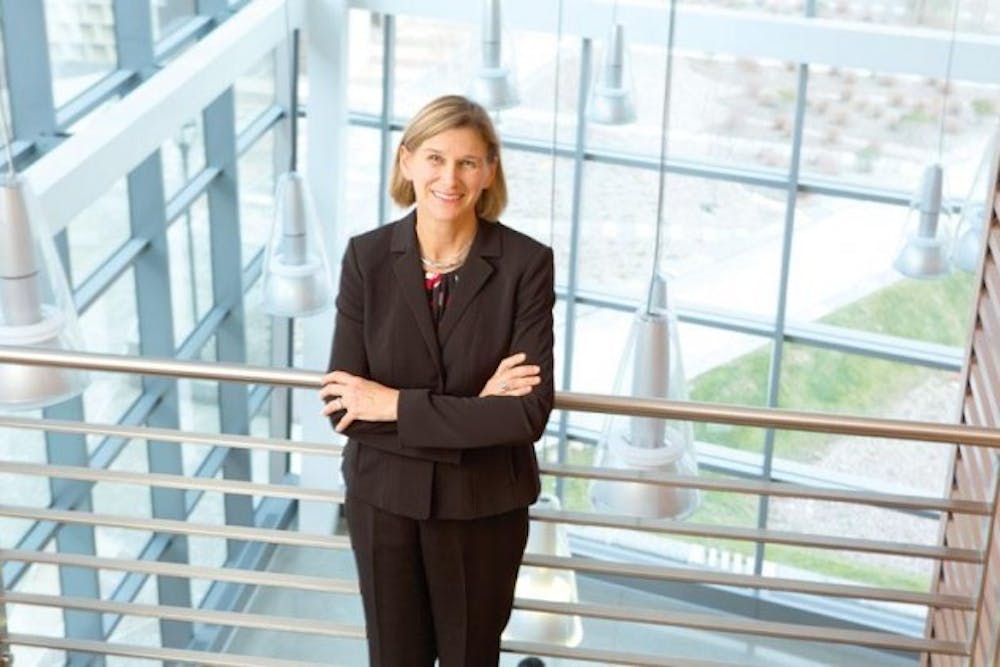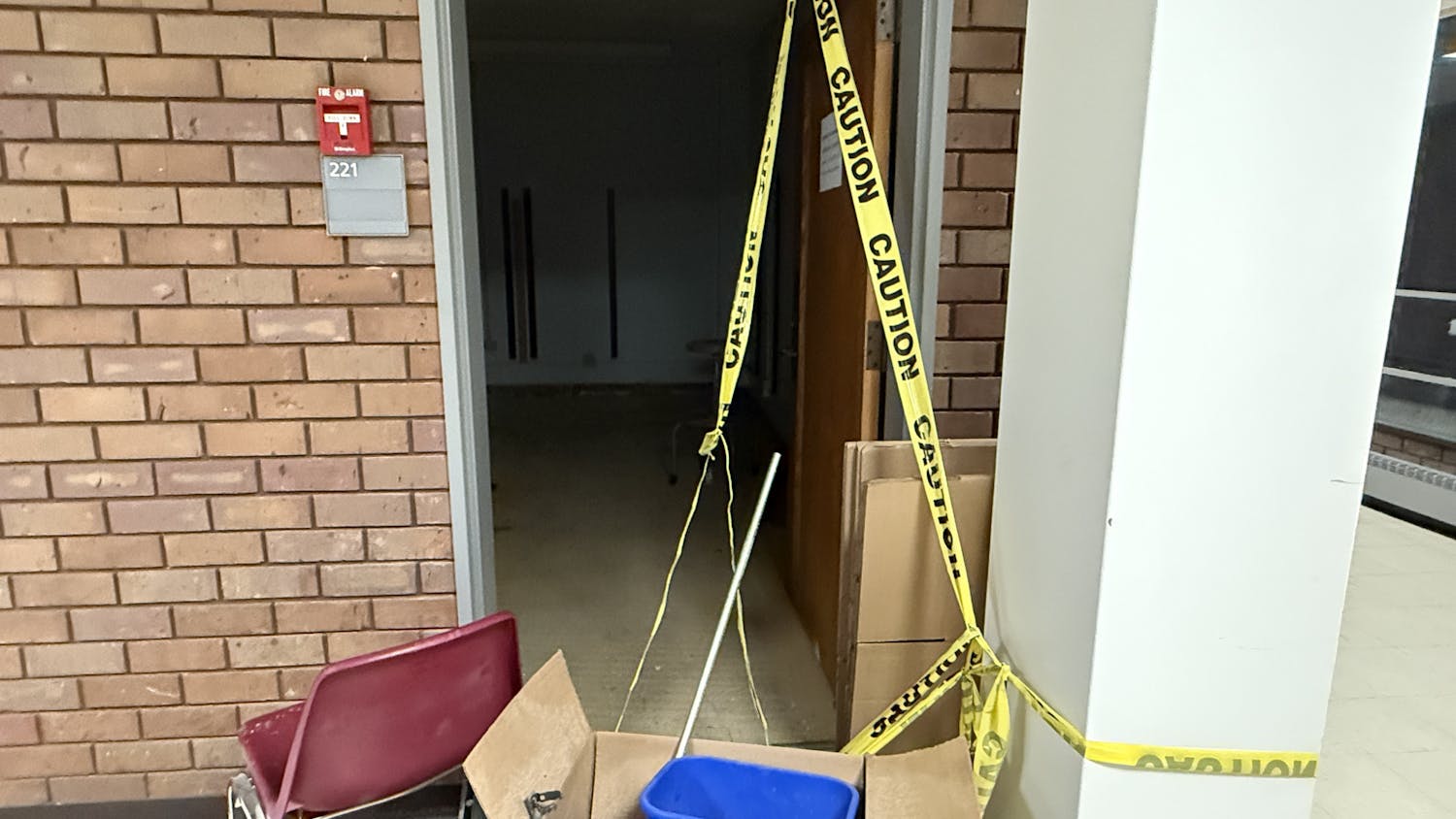In 1984, Australia held its first science summer program for high school students.
Liesl Folks was there. When the 16-year-old laid her sights on a nuclear accelerator, she knew she wanted to be a scientist.
Now Folks is one of seven female deans of any engineering school in the United States.
That summer 29 years ago, the self-proclaimed "prototypical geek" had the opportunity to visit the Australian National University, where she saw the nuclear accelerator - a device that speeds particles up to create high energies allowing scientists to do various experiments. She was astounded by the sheer magnitude and power of the piece of equipment.
Folks, the new dean of the School of Engineering and Applied Sciences (SEAS), has worked over 15 years in the private sector for IBM and Hitachi. The Australia native plans to take her experiences and passion for science and apply them to her new role at UB to recruit more women to the engineering field and enhance the university's rank and reputation.
One of Folks' biggest concerns is women's disinterest in engineering. She plans to strengthen programs for college students, local high schools and grade schools to increase engineering appeal not only for women but underrepresented minorities.
"For UB as an institution, I think it is terrific for UB to have a woman in a position of leadership in what is a traditionally male-dominated field," said Bruce Pitman, the dean of the College of Arts and Sciences, in an email. "She is a great role model for young women considering a career in [science, technology, engineering, and mathematics (STEM)] fields."
Folks went to Penrhos Ladies College, an all-girls high school in Perth, Western Australia. She said the stigma of a girl pursuing a career in the sciences was non-existent there because the school pushed girls to excel in those fields, to which she partially attributes her passion.
She went on to major in physics at the University of Western Australia and became an academic at the same school until she left to work in the private sector.
Pitman, who was on the search committee that interviewed Folks for the dean position, said Folks' hiring will strengthen UB's engineering and industry collaborations.
He agrees UB has to make an effort to bring more women into SEAS. He said in addition to Folks' credentials and industry experience, she is the person who will pique the interest of women.
"For me, the most critical thing is for when you get women and underrepresented minorities into engineering, nurture them as best you can to make sure they get out the other end, that we don't lose them along the way, that they don't become disenchanted for whatever reason and drop out of the program," Folks said.
Folks compared this "problem" to the issue in the field of medicine. She said a few years ago, medicine was a male-dominated field, but now, there are more women pursuing a career in the field than men. However, that same trend isn't happening in the engineering field.
Folks said her experience in industry is very different from academia, but she is excited to tackle the task of enhancing SEAS.
"In business, you pretty much have a single focus, which is to push your product out the door and to make money," Folks said. "Here, we have many missions - education may be the prime among them, but also engagement with the broader community, with industry and with [lower-level] education. It's a much more interesting ecosystem."
Folks replaced Harvey G. Stenger Jr., who stepped down in April 2011; she has held the position since January. She was selected as one of four finalists in October.
"She has a great experience with industry, and she has a lot of connections," said President Satish Tripathi on Feb. 6. "She is a leader in the field and she has a great connection with academia. At the end of the day, [we hired her] because of the fit and how the rest of the university felt."
She said there is a perception that UB doesn't do enough with industry. But she found UB does an enormous amount of interaction with industry, but not many people outside the university know about its "breadth and depth."
"We need to be proactive about communicating our successes in research with the broader community, not just with the funding agencies but also with the business community and industry," Folks said.
UB is currently ranked the 54th-best engineering school in the country, according to U.S. News & World Report. Folks said she is going to work to move UB further up the list.
Venu Govindaraju is a distinguished professor in computer science and engineering who served on the search committee that interviewed Folks. He said her leadership as the president of the Institute of Electrical and Electronics Engineers' Magnetics Society - also being the first woman to hold this prestigious position - will propel UB's rank and reputation.
"Liesl's industry leadership experience coupled with her understanding of true excellence in scholarship are already making a positive impact on the faculty and students of the school," Govindaraju said in an email. "Her dynamic vision and passionate commitment to higher education are strong assets in steering us toward fulfilling the mission of establishing UB engineering as a world-class program."
Last year, the number of students in the engineering department increased 50 percent, according to Provost Charles Zukoski. Folks is excited about the new challenge.
She said the heightened interest is a good thing and means more students and parents are realizing the importance of engineering in the future of the country.
However, she said dealing with the sudden increase of students can be problematic, and she would have to come up with creative solutions to cater to their needs.
"The challenge for us is that you can't ramp a university's capacity to take on students very quickly," Folks said. "We can't build our classrooms fast enough to meet the demand, for example. So we are going to have to get much more cunning on how we deliver education to make sure that quality isn't compromised, but we can deal with these variables."
Folks' experience at Hitachi and IBM - in the data storage industry, in which she focused on finding ways to make hard-disk drives more efficient at low costs - has taught her how to apply her experience in the private sector to academia.
"The most important thing working in industry [is it] trains you for is the importance of setting goals and milestones toward those goals and trying to keep people moving in the same direction," Folks said. "Some of that is a leadership issue, some of it is a question of how to keep people motivated and some of it is operational in making sure you are setting the right goals."
Folks is excited to lead SEAS forward in the engineering world; she hopes more women will join her in the workforce along the way.
Email: news@ubspectrum.com





